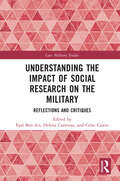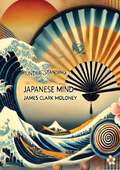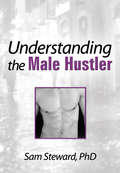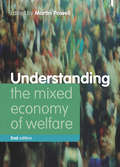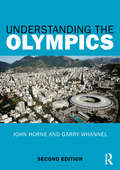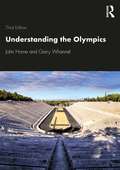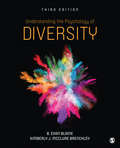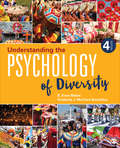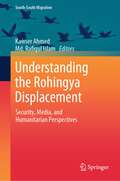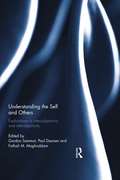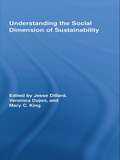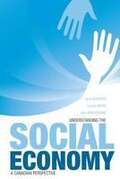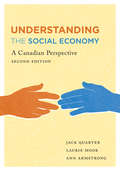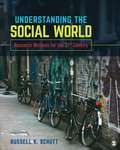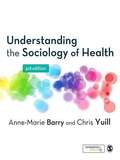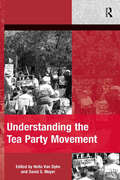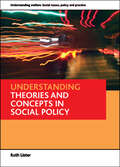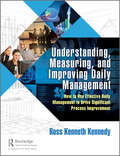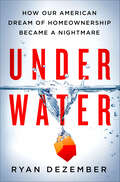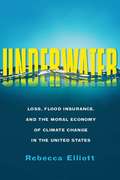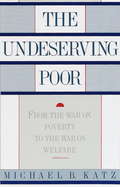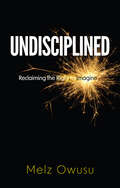- Table View
- List View
Understanding the Impact of Social Research on the Military: Reflections and Critiques (Cass Military Studies)
by Eyal Ben-AriThis book seeks to chart and evaluate the impact of social research on the military itself. By ‘impact’, the authors in this volume simply mean that which has a marked effect or influence on changing military policy, practices, knowledge, skills, behaviour, or living conditions. The book comprises a series of reflective contributions from scholars who have conducted research on the military as external scholars with no formal ties to the armed forces, as 'native' researchers formally linked to them, as well as various kinds of contracted social scientists enabled by the military to carry out their investigations. The authors were asked to make the question of the impact of social scientific research on the armed forces an object of study in itself and to situate their reflections in terms of wider analytical questions. As a result, the chapters can be divided, broadly speaking, into two types of orientation: some are centered on theoretical and analytical issues, while others focus on the researchers’ lived experiences. This book will be of interest to students of military studies, sociology, organisational studies, psychology and political science.
Understanding the Japanese Mind
by James Clark MoloneyExplore the intricate layers of Japanese culture and psychology with James Clark Moloney's insightful work, Understanding the Japanese Mind. This illuminating book delves deep into the unique characteristics and complexities that define Japanese thought and behavior, offering readers a comprehensive guide to understanding the cultural and psychological underpinnings of one of the world’s most fascinating societies.James Clark Moloney, an expert in East Asian studies, combines his extensive research with firsthand experiences to provide a nuanced analysis of the Japanese psyche. Understanding the Japanese Mind covers a wide array of topics, including social norms, communication styles, and the values that shape daily life in Japan. Moloney’s clear and engaging writing makes complex cultural concepts accessible to a broad audience.Key themes in the book include the importance of harmony and group cohesion, the concept of face (tatemae and honne), and the intricate social rituals that govern Japanese interactions. Moloney also explores the historical and philosophical roots of these cultural traits, drawing connections to Zen Buddhism, Confucianism, and Shintoism.This book is an essential resource for students, scholars, business professionals, and anyone interested in gaining a deeper understanding of Japanese culture. Moloney’s balanced approach and thorough analysis offer readers a valuable perspective on the factors that influence Japanese behavior and thought processes.Join James Clark Moloney on a journey into the heart of Japanese culture, and gain a deeper appreciation for the complexities and nuances of the Japanese mind. Understanding the Japanese Mind is a timeless exploration of cultural psychology that continues to resonate with readers seeking to bridge the gap between East and West.
Understanding the Male Hustler
by Sam StewardThis book is a serious study of male hustlers using experiential dialogue to introduce the reader to real-life concepts and experiences that otherwise could not be effectively conveyed. An intriguing attempt to get into the mind and personality of the male hustler through a largely imagined series of dialogues between a well-known fictional hustler and his so-called amanuensis, Samuel Steward, this unique book covers all aspects of the hustler’s motivations, activities, life style, adjustments, advantages, and disadvantages. It accomplishes this dispassionately, without prejudgment, moral censure, approbation, or more than cursory involvement. Therapists and counselors in all fields of sexual functioning will find here some understanding of the causes and impulses (beyond the popular “broken home syndrome”) that lead young males into prostitution. It signals some of the signposts to danger and serious threats to health that accompany the profession of prostitution and also explains to counselors some of the activities and practices of the male prostitute, enabling them to have a better understanding of the fascination and peril of the hustler’s life. The brevity of success in such a calling is also considered, with some consideration for the necessity of long-range planning for the hustler’s future.Important contents: interview of a well-known hustler brief look at early male prostitution--Greek, Roman, Burton’s theory the peacock period and youth as a prerequisite for hustling lures of the profession--money, power, other motivations paths and mechanisms leading to hustling characteristics of different types of hustlers types of clients patronizing hustlers literary illuminations the modus operandi of the male hustler extraordinary dangers confronting the male hustler today the attractiveness of the “seeing-through” of a hustler to past clients quo vadis for the hustler after youth passes Readers will be amazed by the daily hazards and drawbacks as well fascinated by the curiosities and rewards of the hustler’s profession. Especially of interest to therapists and counselors, Understanding the Male Hustler is also valuable for sociologists, anthropologists, medical specialists, psychiatrists, psychologists.
Understanding the Mixed Economy of Welfare (second edition)
by Martin PowellAs the state withdraws from welfare provision, the mixed economy of welfare – involving private, voluntary and informal sectors – has become ever more important. This second edition of Powell’s acclaimed textbook on the subject brings together a wealth of respected contributors. New features of this revised edition include: • An updated perspective on the mixed economy of welfare (MEW) and social division of welfare (SDW) in the context of UK Coalition and Conservative governments • A conceptual framework that links the MEW and SDW with debates on topics of major current interest such as ‘Open Public Services’, ‘Big Society’, Any Qualified Provider’, Private Finance Initiative (PFI) and ‘Public Private Partnerships’ (PPP) Containing helpful features such as summaries, questions for discussion, further reading suggestions and electronic resources, this will be a valuable introductory resource for students of social policy, social welfare and social work at both undergraduate and postgraduate level.
Understanding the Olympics
by John Horne Garry WhannelThe Olympic Games is unquestionably the greatest sporting event in the world, with billions of viewers across the globe. How did the Olympics evolve into this multi-national phenomenon? How can the Olympics help us to understand the relationship between sport and society? What will be the impact and legacy of the 2016 Olympics in Rio? Now in a fully revised and updated new edition that places Rio 2016 in the foreground, Understanding the Olympics answers all these questions by exploring the social, cultural, political, historical and economic context of the Games. This book presents the latest research on the Olympics, including new material on legacy, sustainability and corruption, and introduces the reader to all of the key themes of contemporary Olympic Studies including: the history of the Olympics Olympic politics access and equity the Olympics and the media festival and spectacle the Olympic economy urban development Olympic futures. The most up-to-date and authoritative introduction to the Olympic Games, this book contains a full Olympic history timeline as well as illustrations, information boxes and ‘Olympic Stories’ in every chapter. Understanding the Olympics is essential reading for anybody with an interest in the Olympics or the wider relationship between sport and society.
Understanding the Olympics
by John Horne Garry WhannelHow did the Olympics evolve into a multi-national phenomenon? How can the Olympics help us to understand the relationship between sport and society? What will be the impact and legacy of the Olympics after Tokyo in 2020? Understanding the Olympics answers all these questions by exploring the social, cultural, political, historical and economic context of the Games. This thoroughly revised and updated edition discusses recent attempts at future proofing by the International Olympic Committee (IOC) in the face of growing global anti-Olympic activism, the changing geo-political context within which the Olympics take place, and the Olympic histories of the next three cities to host the Games – Tokyo (2020), Paris (2024) and Los Angeles (2028) – as well as the legacy of the London (2012) Olympics. For the first time, this new edition introduces the reader to the emergence of &‘other Games&’ associated with the IOC – the Winter Olympics, the Paralympics, and the Youth Olympics. It also features a full Olympic history timeline, many new photographs, refreshed suggestions for further reading, and revised illustrations. The most up-to-date and authoritative textbook available on the Olympic Games, Understanding the Olympics is essential reading for anybody with an interest in the Olympics or the wider relationship between sport and society.
Understanding the Psychology of Diversity
by B. Evan Blaine Kimberly J. BrenchleyThe updated Third Edition of this best seller presents a highly readable examination of diversity from a unique psychological perspective to teach students how to understand social and cultural differences in today’s society. By exploring how individuals construct their view of social diversity and how they are defined and influenced by it, author B. Evan Blaine and new coauthor Kimberly J. McClure Brenchley present all that psychology has to offer on this critically important topic. The new edition features chapters on traditional topics such as categorization, stereotypes, sexism, racism, and sexual prejudice, in addition to chapters on nontraditional diversity topics such as weightism, ageism, and social stigma. Integrated throughout the text are applications of these topics to timely social issues.
Understanding the Psychology of Diversity
by B. Evan Blaine Kimberly J. BrenchleyThe updated Third Edition of this best seller presents a highly readable examination of diversity from a unique psychological perspective to teach students how to understand social and cultural differences in today’s society. By exploring how individuals construct their view of social diversity and how they are defined and influenced by it, author B. Evan Blaine and new coauthor Kimberly J. McClure Brenchley present all that psychology has to offer on this critically important topic. The new edition features chapters on traditional topics such as categorization, stereotypes, sexism, racism, and sexual prejudice, in addition to chapters on nontraditional diversity topics such as weightism, ageism, and social stigma. Integrated throughout the text are applications of these topics to timely social issues.
Understanding the Psychology of Diversity
by Bruce E. Blaine Kimberly J. BrenchleyUnderstanding the Psychology of Diversity offers a highly accessible examination of diversity to show students how to understand social and cultural differences in today’s society. Taking a psychological perspective, authors B. Evan Blaine and Kimberly J. McClure Brenchley explore how individuals construct their view of social diversity and how they are defined and influenced by it. The book covers traditional topics like categorization and stereotypes, sexism, racism, and social stigma, as well as non-traditional topics like sexual orientation-based prejudice, weight and appearance-based prejudice, diversity on television, and age stereotypes and ageism. The Fourth Edition confronts the credibility crisis that has surfaced in the academic psychological research community by following parameters for the research that is presented.
Understanding the Psychology of Diversity
by Bruce E. Blaine Kimberly J. BrenchleyUnderstanding the Psychology of Diversity offers a highly accessible examination of diversity to show students how to understand social and cultural differences in today’s society. Taking a psychological perspective, authors B. Evan Blaine and Kimberly J. McClure Brenchley explore how individuals construct their view of social diversity and how they are defined and influenced by it. The book covers traditional topics like categorization and stereotypes, sexism, racism, and social stigma, as well as non-traditional topics like sexual orientation-based prejudice, weight and appearance-based prejudice, diversity on television, and age stereotypes and ageism. The Fourth Edition confronts the credibility crisis that has surfaced in the academic psychological research community by following parameters for the research that is presented.
Understanding the Rohingya Displacement: Security, Media, and Humanitarian Perspectives (International Perspectives on Migration)
by Kawser Ahmed Md. Rafiqul IslamThis book provides a focused and comprehensive understanding of the conflict surrounding the Rohingya displacement, using a unique peace and conflict transformation viewpoint. Divided into four sections and nineteen chapters, it covers significant themes related to the conflict. It provides an in-depth examination of its security implications, media impact, and the need for a long-term transformation strategy. The authors offer a sharp perspective on the crisis, covering a wide range of topics, including human rights abuses, geopolitics, media influence, and repatriation of the Rohingya. Each chapter focuses on a different aspect of the conflict, providing readers with a thorough understanding of the Rohingya displacement-related conflict. The authors advocate for a peaceful end to the conflict through repatriation, offering valuable conflict transformation tools for decision-makers in Bangladesh and around the world. This book is essential for anyone seeking a deeper understandingof the conflict's security implications and highlights original research from academics on the role of the media. It is relevant for scholars, politicians, decision-makers in the security and refugee management fields, academics studying the media, and humanitarian actors.
Understanding the Self and Others: Explorations in intersubjectivity and interobjectivity
by Fathali M. Moghaddam Gordon Sammut Paul DaanenHow do we, as human beings, come to understand ourselves and others around us? This question could not be more timely or pertinent to the issues facing humankind today. At the heart of many of our world’s most troubling political and social problems lies a divergence, and sometimes a sharp contradiction, in perspectives between nations and cultural groups. To find potential solutions to these seemingly intractable divides, we must come to understand what both facilitates and hinders a meaningful exchange of fundamental ideas and beliefs between different cultural groups. The discussions in this book aim to provide a better understanding of how we come to know ourselves and others. Bringing together a number of cutting edge researchers and practitioners in psychology and related fields, this diverse collection of thirteen papers draws on psychology, sociology, philosophy, linguistics, communications, and anthropology to explore how human beings effectively come to understand and interact with others. This volume is organised in three main sections to explore some of the key conceptual issues, discuss the cognitive processes involved in intersubjectivity and interobjectivity, and examine human relations at the level of collective processes. Understanding the Self and Others will appeal to students and scholars of sociology, developmental psychology, philosophy, communication studies, anthropology, identity studies, social and cultural theory, and linguistics.
Understanding the Social Dimension of Sustainability (Routledge Studies in Development and Society)
by Veronica Dujon Jesse Dillard Mary C. KingThe imperative of the twenty-first century is sustainability: to raise the living standards of the world's poor and to achieve and maintain high levels of social health among the affluent nations while simultaneously reducing and reversing the environmental damage wrought by human activity. Scholars and practitioners are making progress toward environmental and economic sustainability, but we have very little understanding of the social dimension of sustainability. This volume is an ambitious, multi-disciplinary effort to identify the key elements of social sustainability through an examination of what motivates its pursuit and the conditions that promote or detract from its achievement. Included are theoretical and empirical pieces; examination of international and local efforts; discussions highlighting experiences in both the developing and industrialized nations; and a substantial focus on business practices. Contributors are grounded in sociology, economics, business administration, public administration, public health, geography, education and natural resource management.
Understanding the Social Economy
by Jack Quarter Laurie Mook Ann ArmstrongIn Understanding the Social Economy, Jack Quarter, Laurie Mook, and Ann Armstrong integrate a wide array of organizations founded upon a social mission - social enterprises, nonprofits, co-operatives, credit unions, and community development associations - under the rubric of the 'social economy.' This framework facilitates a comprehensive study of Canada's social sector, an area often neglected in the business curricula despite the important role that these organizations play in Canada's economy.Invaluable for business programs that address issues such as community economic development, co-operatives, and nonprofit studies and management, Understanding the Social Economy presents a unique set of case studies as well as chapters on organizational design and governance, social finance and social accounting, and accountability. The examples provide much needed context for students and allow for an original and in-depth examination of the relationships between Canada's social infrastructure and the public and private sectors. With this work, Quarter, Mook, and Armstrong illuminate a neglected facet of business studies to further our understanding of the Canadian economy.
Understanding the Social Economy: A Canadian Perspective, Second Edition
by Jack Quarter Laurie Mook Ann ArmstrongSuitable for courses addressing community economic development, non-profit organizations, co-operatives and the social economy more broadly, the second edition of Understanding the Social Economy expands on the authors’ ground-breaking examination of organizations founded on a social mission – social enterprises, non-profits, co-operatives, credit unions, and community development organizations. While the role of the private and public sectors are very much in the public light, the social economy is often taken for granted. However, try to imagine a society without the many forms of organizations that form the social economy: social service organizations, arts and recreation organizations, ethno-cultural associations, social clubs, self-help groups, universities and colleges, hospitals and other healthcare providers, foundations, housing co-operatives, or credit unions. Not only do these organizations provide valuable services, but they employ many people, and purchase goods and services. They are both social and economic entities. Understanding the Social Economy illustrates how organizations in the social economy interact with the other sectors of the economy and highlights the important social infrastructure that these organizations create. The second edition contains six new case studies as well three new chapters addressing leadership and strategic management, and human resources management. A much-needed work on an important but neglected facet of organizational studies, Understanding the Social Economy continues to be an invaluable resource for the classroom and for participants working in the social sector.
Understanding the Social World Research Methods for the 21st Century
by Russell K. SchuttUnderstanding the Social World: Research Methods for the 21st Century is a textbook for the fast-paced, globally interconnected social world of the new century. Bestselling author Russell K. Schutt rises to the research requirements of a social world shaped by big data and social media, Instagram and avatars, blogs, and tweets; and he confronts the research challenges created by cell phones, privacy concerns, linguistic diversity and multicultural neighbourhoods. Understanding the Social World is visually sleek, taking students across disciplinary and national boundaries and transcending past research debates by emphasizing mixed methods, concern for human subjects, and application of results. Accessible, with timely examples and engaging exercises, this title brings a new and clear understanding to the practice and process of research.
Understanding the Sociology of Health
by Chris Yuill Anne-Marie BarryUnderstanding the Sociology of Health, 3rd Edition is a truly 'readable' introduction to a subject which is often shrouded in jargon. Providing case studies and exercises to really get you thinking, this book shows how sociology provides the means to answer complex questions about health and illness, such as why health inequalities exist: The 3rd edition includes four new chapters on - history of health & healing - sexuality - sport, fitness & exercise - death & dying Though aimed primarily at students on health and social care courses and professions allied to medicine, this textbook provides valuable insights for anyone interested in the social aspects of health. Visit the companion website at www.sagepub.co.uk/barryandyuill3e to find a range of teaching and learning material for lecturers and students.
Understanding the Tacit (Routledge Studies in Social and Political Thought #81)
by Stephen P. TurnerThis book outlines a new account of the tacit, meaning tacit knowledge, presuppositions, practices, traditions, and so forth. It includes essays on topics such as underdetermination and mutual understanding, and critical discussions of the major alternative approaches to the tacit, including Bourdieu’s habitus and various practice theories, Oakeshott’s account of tradition, Quentin Skinner’s theory of historical meaning, Harry Collins’s idea of collective tacit knowledge, as well as discussions of relevant cognitive science concepts, such as non-conceptual content, connectionism, and mirror neurons. The new account of tacit knowledge focuses on the fact that in making the tacit explicit, a person is not, as many past accounts have supposed, reading off the content of some sort of shared and fixed tacit scheme of presuppositions, but rather responding to the needs of the Other for understanding.
Understanding the Tea Party Movement (The Mobilization Series on Social Movements, Protest, and Culture)
by Nella Van DykeHailing themselves as heirs to the American Revolution, the Tea Party movement staged tax day protests in over 750 US cities in April 2009, quickly establishing a large and volatile social movement. Tea Partiers protested at town hall meetings about health care across the country in August, leading to a large national demonstration in Washington on September 12, 2009. The movement spurred the formation (or redefinition) of several national organizations and many more local groups, and emerged as a strong force within the Republican Party. Self-described Tea Party candidates won victories in the November 2010 elections. Even as activists demonstrated their strength and entered government, the future of the movement's influence, and even its ultimate goals, are very much in doubt. In 2012, Barack Obama, the movement’s prime target, decisively won re-election, Congressional Republicans were unable to govern, and the Republican Party publicly wrestled with how to manage the insurgency within. Although there is a long history of conservative movements in America, the library of social movement studies leans heavily to the left. The Tea Party movement, its sudden emergence and its uncertain fate, provides a challenge to mainstream American politics. It also challenges scholars of social movements to reconcile this new movement with existing knowledge about social movements in America. Understanding the Tea Party Movement addresses these challenges by explaining why and how the movement emerged when it did, how it relates to earlier eruptions of conservative populism, and by raising critical questions about the movement's ultimate fate.
Understanding theories and concepts in social policy (Understanding Welfare: Social Issues, Policy and Practice)
by Ruth ListerA central theme of this lively and accessible text is that theory helps us to understand policy, politics and practice. The book combines an in-depth exploration of selected theoretical perspectives and concepts with the student-friendly format of the Understanding Welfare series. The author uses diverse examples from contemporary social policy to help theoretical arguments come alive. It should provide a key text for 2nd and 3rd year undergraduates and postgraduates in social policy and related subjects, as well as their teachers.
Understanding, Measuring, and Improving Daily Management: How to Use Effective Daily Management to Drive Significant Process Improvement
by Ross KennedyUnderstanding, Measuring, and Improving Daily Management explains the critical parts of a continuous improvement strategy to achieve Operational Excellence and where reactive improvement through effective daily management fits in. In addition, it shows the consequences to your Operational Excellence journey if daily management is not performed well. Reactive improvement develops the capability and discipline within the organization to be able to rapidly recover from an event or incident that stops you from achieving your expected or target performance for the day, shift, or hour and most importantly -- your ability to capture the learning and initiate corrective actions so that the event or incident will not re-occur anywhere across the organization. As such, reactive improvement focuses on improving daily management through your daily review meetings, your information centers supporting the daily review meetings, and your frontline problem-solving root cause analysis capability at all levels. The book introduces the seven elements of reactive improvement that must work in concert for effective daily management and allows the reader to rate their site or department to determine their starting point compared to best practices: 1. Supportive organization structure to support development of your people so they have ownership and accountability for the performance of their area of responsibility; 2. Effective frontline leaders to ensure everyone else in the leadership structure are not working down a level; 3. Appropriate measures with expected targets that are linked to the site’s Key Success Factors for Operations to ensure goal alignment, and are relevant to the area being focused on; 4. Structured daily review meetings to identify opportunities (problems/incidents) and monitor progress of their solution so they don’t happen again; 5. Visual information centers that visually display daily and trending performance along with monitoring of actions to address problems/issues raised; 6. Frontline problem-solving root cause analysis capability across the site; and 7. Rapid sharing of learning capability across shifts, departments, and the organization. The author outlines in detail why each of the seven elements are important to achieving Operational Excellence, and most importantly, how to implement each element supported with many templates and tools.
Underwater: How Our American Dream of Homeownership Became a Nightmare
by Ryan DezemberWinner of the Bruss Real Estate Book AwardHis assignment was to write about a real-estate frenzy lighting up the Redneck Riviera. So Ryan Dezember settled in and bought a home nearby himself. Then the market crashed, and he became one of the millions of Americans who suddenly owed more on their homes than they were worth. A flood of foreclosures made it impossible to sell. It didn't help that his quaint neighborhood fell into disrepair and drug-induced despair. He had no choice but to become a reluctant and wildly unprofitable landlord to move on. Meanwhile, his reporting showed how the speculative mania that caused the crash opened the U.S. housing market to a much larger breed of investors. In this deeply personal story, Dezember shows how decisions on Wall Street and in Washington played out on his street in a corner of the Sunbelt that was convulsed by the foreclosure crisis. Readers will witness the housing market collapse from Dezember’s perch as a newspaper reporter. First he’s in the boom-to-bust South where a hot-air balloonist named Bob Shallow becomes one of the world’s top selling real-estate agents arranging condo flips, developers flop in spectacular fashion and the law catches up with a beach-town mayor on the take. Later he’s in New York, among financiers like Blackstone’s Stephen Schwarzman who are building rental empires out of foreclosures, staking claim to the bastion of middle-class wealth: the single-family home. Through it all, Dezember is an underwater homeowner caught up in the mess.A cautionary tale of Wall Street's push to turn homes into assets, Underwater is a powerful, incisive story that chronicles the crash and its aftermath from a fresh perspective—the forgotten, middle-class homeowner.
Underwater: Loss, Flood Insurance, and the Moral Economy of Climate Change in the United States (Society and the Environment)
by Rebecca ElliottCommunities around the United States face the threat of being underwater. This is not only a matter of rising waters reaching the doorstep. It is also the threat of being financially underwater, owning assets worth less than the money borrowed to obtain them. Many areas around the country may become economically uninhabitable before they become physically unlivable.In Underwater, Rebecca Elliott explores how families, communities, and governments confront problems of loss as the climate changes. She offers the first in-depth account of the politics and social effects of the U.S. National Flood Insurance Program (NFIP), which provides flood insurance protection for virtually all homes and small businesses that require it. In doing so, the NFIP turns the risk of flooding into an immediate economic reality, shaping who lives on the waterfront, on what terms, and at what cost.Drawing on archival, interview, ethnographic, and other documentary data, Elliott follows controversies over the NFIP from its establishment in the 1960s to the present, from local backlash over flood maps to Congressional debates over insurance reform. Though flood insurance is often portrayed as a rational solution for managing risk, it has ignited recurring fights over what is fair and valuable, what needs protecting and what should be let go, who deserves assistance and on what terms, and whose expectations of future losses are used to govern the present. An incisive and comprehensive consideration of the fundamental dilemmas of moral economy underlying insurance, Underwater sheds new light on how Americans cope with loss as the water rises.
Undeserving Poor
by Michael KatzFor the first time in over twenty-five years. the issue of poverty -- and our failure to deal with it -- is back at the top of the policy agenda and on the front page of the news. In this magisterial overview social historian Michael B. Katz, examines the ideas and assumptions that have shaped public policy from the sixties War on Poverty to the current war on welfare. Closely argued and lucidly written. The Undeserving Poor transcends the barriers that have channeled the American discussion of poverty and wealth into a narrow, self-defeating course, and points the way to a new, constructive approach to our major social problem.From the Trade Paperback edition.
Undisciplined: Reclaiming the Right to Imagine
by Melz OwusuUndisciplined is an odyssey into possibility. Challenging us to break free from limiting strictures and structures, it encourages readers to envision just futures and reflect on the inner transformation required to become the custodians of those worlds.In a profound and heartfelt offering, Melz Owusu delves into the stifling impact of the education system on imagination. They probe alternative, deeply spiritual connections to knowledge, and the pursuit of new ways of being as acts of remembrance of a common past. Seamlessly transitioning between intellectual discourse, personal reflections, and spiritual contemplations, Melz navigates the ‘undisciplining’ of mind and spirit, guiding readers towards the healing and liberatory potential of the heart and the imagination.Undisciplined is not a prescriptive manual but an invitation. Freedom takes many forms, and this book is intended as one route of exploration: a mind-opening and perspective-shifting appraisal of how we might imagine a more just and liberated world, and the path to accessing its beauty.
